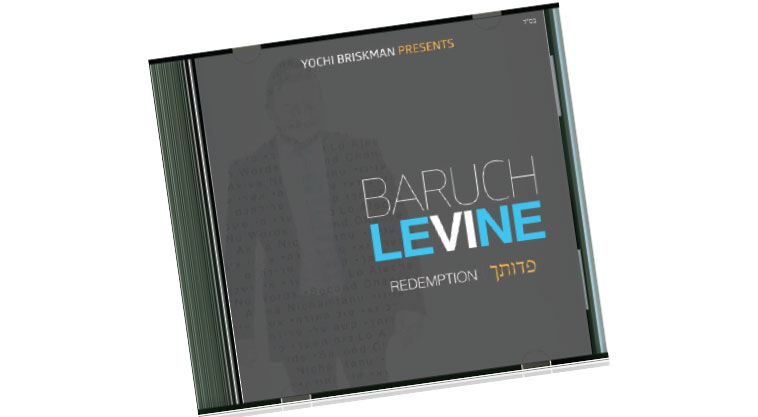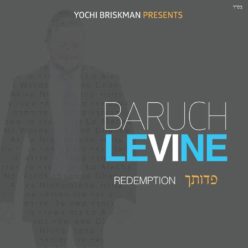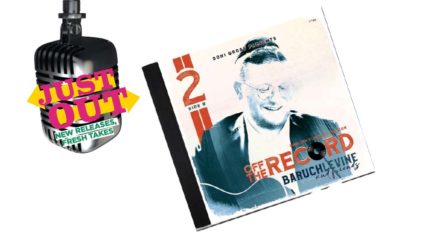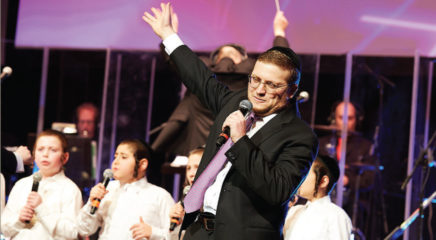Just Out: New Releases, Fresh Takes
Baruch Levine’s English-language album, Touched by a Niggun, is almost ten years old. It’s still selling, though, and fans have been requesting an encore. Producing another full-length English album wasn’t on his agenda at this time, but with PEDUSCHA, released this Chanukah, Levine has hit a winning combination by including four inspiring English songs within the shirei kodesh. All the English lyrics are by Mrs. Ruchie Torgow, who gained acclaim for the English version of “Veharev Na,” composed by Levine for the 2017 siyum of V’haarev Na, a Torah movement that gives bochurim a love of Gemara learning through their encompassing chazarah program. The “Veharev Na” niggun on this album, sung together with Benny Friedman, was composed for the organization’s 2018 simchas haTorah (both versions are accompanied by inspirational videos).
The English songs on Peduscha, while all have a poignant message, vary in style. Track 2, “Akiva Nichamtanu,” is an emotional ode to the famous comfort offered by Rabi Akiva on viewing the ruins of the Beis Hamikdash, who explained to his colleagues that just as the destruction was the fulfilment of Hashem’s word, so the promise of rebirth would be fulfilled: “…And though we’ve cried so many tears, we are comforted by you/ Akiva, Akiva nichamtanu.”
Levine says its message is very much for our times. “In decades gone by we went through a tekufah of mourning and memorial songs, “Ani Maamin” and “Yizkor” and the like, and we are now in the next era, an era of hope. Although there is still so much pain, we need to be reminded that we’re living in a time that’s the precursor to Geulah.”
Striking a completely different note, with a lighter feel reminiscent of the iconic Journeys albums, is “Lo Alecha,” on which Eli Schwebel gives a stirring guest appearance. The song offers a few fun scenarios that reflect the Pirkei Avos adage “the work is not yours to finish, but neither are you free to absolve yourself of it.” Levine says he was excited to have such a song on his album, as it reflects a message he’s heard often from his rebbi, Rabbi Yosef Elefant: “A person can’t shteig with an all-or-nothing attitude.”
Performing at the V’haarev Na siyum last year, Baruch Levine was seated next to Rabbi Chaim Nosson “Nate” Segal, who suggested that he play “Lo Alecha Hamelachah Ligmor,” a popular song from the 1970s and ’80s. Most of today’s teens wouldn’t be familiar with that version, but Levine felt it was time to update this message of personal effort and bring it to 2018. After composing the upbeat chorus one Shabbos, he was stuck for words to make up the song’s stanzas, until he thought of presenting the concept in English — and then the ideas just flowed.
The album even includes one song composed way back before “Vezakeini” made Baruch Levine a household name. “I once wrote a song called ‘No Words,’ a tribute to our parents for their milestone anniversaries, and my wife wrote the lyrics. The idea is that we can never do enough to repay them, but we pay our debt forward, toward our own children. When Yochi Briskman came over to work on songs for this album, he found this song and liked it.”
With lyrics rewritten by Ruchie Torgow, the song describes a young couple walking down the aisle accompanied by their parents, then segues to 25 years later, as the couple escorts their own children to the chuppah and realizes anew what their parents did for them — “all we can promise, all we can do / is give to our children what we got from you.” Once again, with a soft, musical touch, Rabbi Levine does what he does best — opens our eyes and hearts to a stirring of sincere feeling, this time, gratitude for our parents who gave us everything, beginning with our very lives. (Originally featured in Mishpacha, Issue 740)
a






